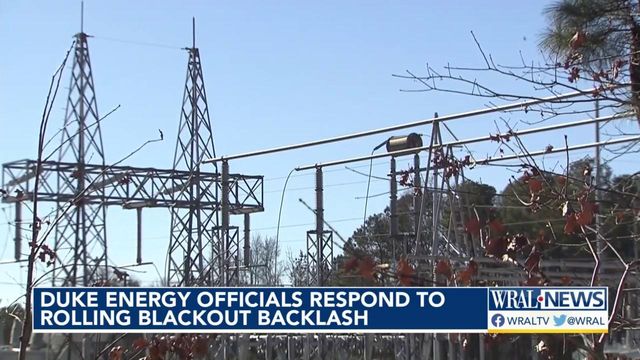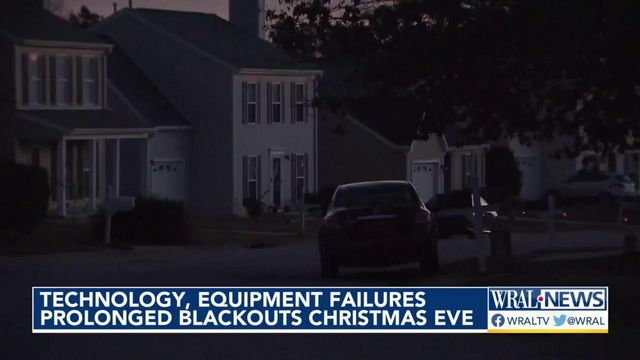Duke Energy apologizes to customers, says demand for electricity led to rolling Christmas Eve blackouts
Duke Energy on Tuesday apologized to customers and explained what caused rolling blackouts that left half a million people without power over Christmas weekend.
Posted — UpdatedDuke Energy on Tuesday apologized to customers and explained what caused rolling blackouts that left half a million people without power over Christmas weekend.
Duke Energy leaders reported findings of their investigation to the North Carolina Utilities Commission at 10 a.m. Tuesday, saying they're "incredibly sorry" to everyone affected by the blackouts.
"We own what happened," said Duke Energy Carolina CEO Julie Jansen. "We have set out on a path to ensure that if we're faced with similar challenges, we will see a different outcome."
Leaders said a combination of factors led Duke Energy to have to use rolling blackouts for the first time in the utility’s history, adding that the program meant to manage the blackouts did not work correctly. According to Duke, rapidly plunging temperatures late on Dec. 23 and early on Dec. 24 caused a spike in demand for electricity, which outpaced projections and diminished generation capacity. Duke Energy said it was forced to initiate the automated power outages as a result of the demand.
"We acknowledge the outages themselves lasted far longer than we expected," Jansen said.
Duke’s North Carolina President Kendal Bowman said the demand for power was about 10% higher than expected because the temperatures outside fell faster than anticipated. At the same time, she said, the company suddenly lost about half the generating power at three power plants because instrumentation froze up in the cold, despite weather proofing by the utility.
"Not only were the temperatures much lower than typical in our region, they dropped at a very fast rate," Bowman said. "It got much colder, much faster than what we normally see here in the Carolinas."
Duke Energy spokesperson Jeff Brooks echoed Bowman's sentiments about the weather conditions.
"The conditions we were dealing with were the same conditions that were being dealt with across all the Southeast and much of the East Coast," Brooks said. "And so, it created a situation where it was very difficult to get assistance, even stuff that we had already booked and scheduled into our system."
When they turned to the grid to purchase additional power, it was not available.
"The resources we were counting on to meet forecasted power load were also impacted by weather conditions," Bowman said. "Between midnight and early Saturday morning we lost around 1,300 megawatts of power generating capability due to equipment malfunction ... and power that we purchased from out of state did not materialize."
Duke had never had to use rolling blackouts before, and the automated program that was supposed to manage them did not function. Operators had to conduct the shutdowns and restarts manually, which took longer than expected.
"These measures that were taken were absolutely necessary, and were an important step to maintain the reliability of the grid and to avoid a potentially longer or larger outage," Brooks said.
Duke said energy projections were far below demand. Unable to get power from neighboring states, the utility depleted its reserves. For the first time in company history, Duke instituted rolling outages — known as load shedding.
Using an automated tool, Duke removed 234 circuits, then restored power — but the program stopped working.
“The automated tool did not respond to these load reductions commands requiring the operators to begin executing the required activities for managing load manually," said Duke Energy SVP and Chief Distribution Officer Scott Batson.
Outages that should have lasted 15 to 30 minutes, instead lasted hours.
Executives said the program was just tested earlier in December, and they’ve been investigating what caused that tool to fail.
Duke executives said the alternative to the blackouts would have been to crash the grid for the entire state. They said if they were in the same situation again, they would have to do the same thing, but said they will learn from the mistakes to try to avoid it in the future.
"This is the first time in our company's history that we had to implement rolling service disruptions, and although the majority of our power plants performed well in the storm, the outage process did not go as smoothly as we would have liked," Bowman said.
"It's a computerized system. It's automated," he said. "The system detects where there's a challenge and brings down power there. So, it's really automated. We can't say, 'Yeah keep that neighborhood online, but not that one.' It doesn't work that way. It's an automated process."
Gov. Roy Cooper’s Press Secretary Sam Chan provided WRAL News with info about how the cold weather compromised five Duke Energy facilities. It included the following facilities:
- Dan River, Roxboro and Mayo having units derated overnight from Dec. 23-24.
- Duke Energy also said to the North Carolina Utilities Commission that a Lincoln CT went offline.
- Duke Energy also said Smith was derailed the morning of Dec. 24
"It appears the extra plants were two plants that experienced some cold weather reduction of generation, but AFTER the time of peak demand," Brooks wrote in an email to WRAL News. "So they were not a factor in the event and we were able to reliably meet customer demand for electricity on Christmas Day when those units returned to full service.
"One was a DEP facility, the Smith Energy Complex in Richmond County. The other was a DEC facility, Buck Combined Cycle Plant, in Rowan County."
Although the widespread extreme cold was forecast well in advance, Duke acknowledges it was caught off guard. Some generators failed, and power was unavailable from nearby states with similar weather.
The energy company has been looking into aging infrastructure as a cause of the blackouts. Duke Energy said the current investments they had already made into infrastructure prevented the issues from being worse.
• Credits
Copyright 2024 by Capitol Broadcasting Company. All rights reserved. This material may not be published, broadcast, rewritten or redistributed.






